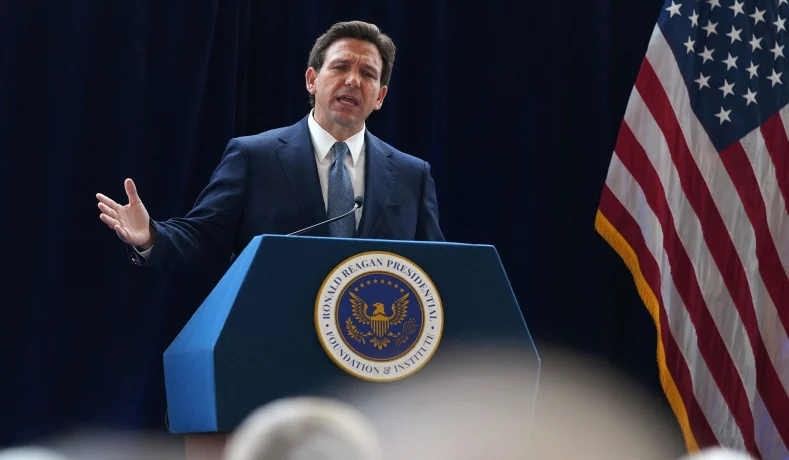
Published March 10, 2023
Florida’s extraordinary House Bill 999 is the most ambitious legislative pushback against the woke university yet. Sponsored by Representative Alex Andrade, H.B. 999 is the legislative flagship in Governor Ron DeSantis’s armada of higher-education reforms.
It has been introduced in the Florida house, and a hearing has been scheduled.
To be sure, H.B. 999 has its problems. In a follow-up piece, I’ll speak to the need to pare back some of the overreach that’s left critics of DeSantis in a dither. Yet the thrust of H.B. 999 is most welcome — and long overdue. Dealing with the bill’s many initiatives and controversies will take several posts. Last week, I defended H.B. 999’s provisions on faculty appointments. Today, I want to examine the bill’s mandates for civic education and the study of Western civilization.
H.B. 999 directs Florida’s public universities to build general-education requirements around courses that “promote the education for citizenship of the constitutional republic.” H.B. 999 also insists that general-education courses “promote the philosophical underpinnings of Western civilization.” On top of that, the bill requires that general-education courses, where appropriate, include “studies of this nation’s historical documents, including the United States Constitution, the Bill of Rights and subsequent amendments thereto, and the Federalist Papers.”
Are you shocked yet? Most people, of course, will find these provisions perfectly ordinary and acceptable. Many professors, on the other hand, see these requirements as downright scary.
The critics will tell you that it’s not so much the content of these requirements that bothers them as the principle at stake. Actually, for many, the content is what they object to. In any case, the principle in play is articulated by liberal campus-free-speech expert Keith Whittington, who frets that “Florida is breaking new ground in insisting that state universities convey the government’s favored message in its classes.” New York Times columnist Thomas Edsall worries about DeSantis laying out “what must be taught.” In Edsall’s view, politicians ought not to be leveraging public universities “in the service of their own agenda.” (Civics and Western civilization: DeSantis’s nefarious agenda exposed!) John Sensbach, chairman of the history department at the University of Florida, says he’s “not convinced that the founding fathers would have endorsed” such an approach.
Let’s begin there. DeSantis might be miffed to learn that in 1779, Thomas Jefferson authored a bill for the reform of Virginia’s William and Mary College even more ambitious than Florida H.B. 999. Jefferson’s “Bill for Amending the Constitution of the College of William and Mary” was meant to revamp a curriculum that Jefferson considered outdated. Jefferson’s bill abolished an entire department (theology) and enhanced legislative control over the college’s board of visitors (trustees). Jefferson’s higher-ed reform bill also mandated new scholarly tasks for the school’s missionary. In addition to his preexisting responsibility to instruct “the several tribes of Indians” in the principles of Christianity, the missionary would now be directed to investigate and record the Indians’ “laws, customs, religions, traditions, and . . . languages.”
In effect, Jefferson was using the legislature to turn William and Mary’s missionary into an anthropologist. These changes were designed to override William and Mary’s existing charter, a step Jefferson justified by pointing out that the college was supported by public funds and could therefore be reformed by the legislature whenever it failed to meet public expectations. Sound familiar?
Jefferson’s bill to reform William and Mary failed, but not because the legislature’s authority to make the changes was in question. Instead, several dissenting religious denominations with influence in the legislature blocked the bill, fearing that this Anglican institution would be strengthened, rather than secularized, by Jefferson’s reforms. Nonetheless, Jefferson’s 1779 bill to reform William and Mary anticipated the vision behind his later founding of the University of Virginia — likewise accomplished through a highly directive legislative charter authored by Jefferson, the famous Rockfish Gap Report of 1818.
Jefferson’s Rockfish Gap Report dedicates the University of Virginia to the advancement of knowledge in the sciences and arts. Yet Jefferson’s legislative charter for UVA lays equal emphasis on the civic purposes of a college education. By legislative charge, the University of Virginia was directed to advance “a sound spirit of legislation, which banishing all arbitrary & unnecessary restraint on individual action shall leave us free to do whatever does not violate the equal rights of another.” Likewise, UVA was instructed to instill in its students “the precepts of virtue and order.” None of that sounds particularly distant from H.B. 999’s instruction to “promote education for citizenship of the constitutional republic” — except perhaps insofar as Jefferson is even more specific and directive than DeSantis regarding the university’s promotion of various values.
Via legislative adoption of the Rockfish Gap Report, Jefferson also shaped the curriculum of the University of Virginia in some detail. Indeed, Jefferson took care to include a proviso that the university “should in all things, & at all times be subject to the control of the legislature.”
It would be a mistake to dismiss this example of legislative authority over a public university’s curriculum as an artifact of the distant past. In 1955, Texas enacted a legislative requirement that students at public universities complete two courses in American history. In 1971, that requirement was incorporated into the Texas Higher Education code. The law also obliges history departments at public universities in Texas to offer enough courses to allow students to fulfill the requirement. The stated purpose of the regulation was to increase the civic knowledge and awareness of public-college students.
Whittington acknowledges that this Texas law stands as something of a precedent for the general-education mandates of H.B. 999 yet points out that the Florida bill goes beyond Texas insofar as it requires the promotion of specific values (i.e., “education for citizenship of the constitutional republic” and “the philosophical underpinnings of Western civilization”).
There is, however, another and more recent precedent for the general-education mandates of H.B. 999: South Carolina’s “Reinforcing College Education on America’s Constitutional Heritage” (REACH) Act of 2021. South Carolina’s REACH Act requires that general-education classes at the state’s public universities include courses in American history or government which, at minimum, assign readings of the U.S. Constitution, the Declaration of Independence, the Emancipation Proclamation, at least five instructor-selected essays from The Federalist Papers, and one or more documents foundational to the African-American freedom struggle. All undergraduates must complete a course that assigns these documents in order to graduate. The REACH Act is thus even more directive on assigned readings than H.B. 999 is. And while the REACH Act doesn’t mandate the promotion of “education for citizenship in our constitutional republic,” that is obviously what its required reading assignments seek to accomplish.
Maybe you’re wondering whether three or four seemingly atypical examples of curricular direction for universities from state legislatures are all that’s out there. Not at all. In truth, state-university general-education courses regularly “convey the government’s favored message.” We just don’t notice it. Consider an only slightly exaggerated instance of our new normal.
Last year, I wrote about Northern Arizona University’s adoption of a requirement that students take four critical theory–based diversity courses in order to graduate. While the initiative for that troubling and thoroughly political requirement emerged from lower levels of the university, the requirement itself had to be approved by the Arizona Board of Regents. That’s because all public-university general-education requirements must be approved by system trustees.
As we’re frequently reminded by opponents of university reform, trustees are “political” appointees — generally selected by a governor, a legislature, or both, and in some states even selected by popular vote. This means that general-education requirements at public universities are supposed to be shaped by the public’s fundamental values, as voiced by their chosen representatives. Academic freedom grants professors the right to control the content of their own individually designed courses. Yet academic freedom does not entitle a professor’s individually designed course to be counted toward the fulfillment of a general-education requirement for graduation. That is a decision on which the public rightly has a voice — traditionally through trustees, but by way of the legislature when necessary.
The shaping of general education is preeminently a question of values. This was affirmed by Harvard’s Redbook report of 1945 (so-called because the cover was red), arguably the most influential statement on general education ever offered. Harvard’s Redbook report, titled “General Education in a Free Society,” affirmed American civics and the Great Books of Western civilization as the core of general education, precisely the view DeSantis hopes to revive.
Harvard’s Redbook readily concedes that knowledge must advance unfettered and that such advancement both requires and encourages individuality, departures from orthodoxy, and societal change. General education, says the Redbook, should not “attempt to convince students of the eternal perfection of existing ideas and institutions.”
Yet the Redbook also argues that required, lower-level general-education courses are precisely where universities ought to emphasize our common heritage and common citizenship. The core purpose of general education, says the Redbook, is to “cultivate . . . an appreciation of both the responsibilities and the benefits which come to [students] because they are Americans and are free.” Compare DeSantis’s legislative directive to “promote” education for citizenship in a constitutional republic with this declaration from the Redbook: “Neither the school nor the college can defensively fail to attempt the promotion of the kind of citizenship upon which the well-being of our entire way of life depends.”
True, the Redbook’s vision was not imposed by government decree. On the contrary, it was willingly taken to heart by colleges and universities across the country, private and public. Yet H.B. 999’s general-education requirements are in no way beyond the legitimate scope of government. The reason legislatures have so seldom chosen to mandate public-university general-education requirements is that there was no such need. America has long enjoyed a rough consensus on what the contents of general education ought to be. That consensus is broken now, and that is why legislatures should become more active on this issue. The system, however, has always had a way of incorporating public values. When the recommendations of Harvard’s Redbook swept the country, it was the authority of appointed or elected trustees that incorporated that vision into our public universities.
Too often nowadays, public-university trustees are too timid or too duped to fight back against general-education requirements that embody values contrary to those held by the citizens of a given state. Nonetheless, it is the right of trustees to reject proposals like Northern Arizona University’s, because general-education requirements are at least as much a question of values as expertise.
That’s why Thomas Edsall’s complaint about DeSantis’s leveraging public universities in the service of his own agenda has it backwards. When it comes to general-education requirements at public universities, the public, through its representatives, is supposed to have a voice. The public’s vision of citizenship is meant to rule — in the first place by way of appointed or elected trustees, but if necessary via the legislature when a public university, as Jefferson put it, “hath not answered [the public’s] expectations.” It is university administrators themselves — when they impose critical theory and DEI-based general-education requirements — who subordinate these institutions to private ideological agendas.
Laws like South Carolina’s REACH Act, and now Florida’s H.B. 999, should be the beginning of a trend. Legislatures need to start to more actively shape public-university general-education requirements. There will be a loud chorus of complaints that this somehow interferes with academic freedom. It does not. The selection of public-university general-education requirements on topics like civics and history is preeminently a matter of values. This is where the public has both a right and obligation to act, something already implicit in the role of public-university trustees (a role too often moribund in practice).
No doubt this change will see blue-state legislatures imposing quadruple critical theory–based diversity requirements on public universities. But we’ve got that already. At least legislatures can defend the red states against the usurpation of a legitimate public interest by radical faculty and university bureaucrats. Yes, there is a danger that such legislative intervention will lead to overreach. And to prove it, there is already some significant overreach in H.B. 999. That will be the topic of a follow-up post.
Stanley Kurtz is a Senior Fellow at the Ethics and Public Policy Center. On a wide range of issues, from K-12 and higher education reform, to the challenges of democratization abroad, to urban-suburban policies, to the shaping of the American left’s agenda, Mr. Kurtz is a key contributor to American public debates. Mr. Kurtz has written on these and other issues for various journals, particularly National Review Online (where he is a contributing editor).
Stanley Kurtz is a Senior Fellow at the Ethics and Public Policy Center. Beyond his work with Education and American Ideals, Mr. Kurtz is a key contributor to American public debates on a wide range of issues from K–12 and higher education reform, to the challenges of democratization abroad, to urban-suburban policies, to the shaping of the American left’s agenda. Mr. Kurtz has written on these and other issues for various journals, particularly National Review Online (where he is a contributing editor).








